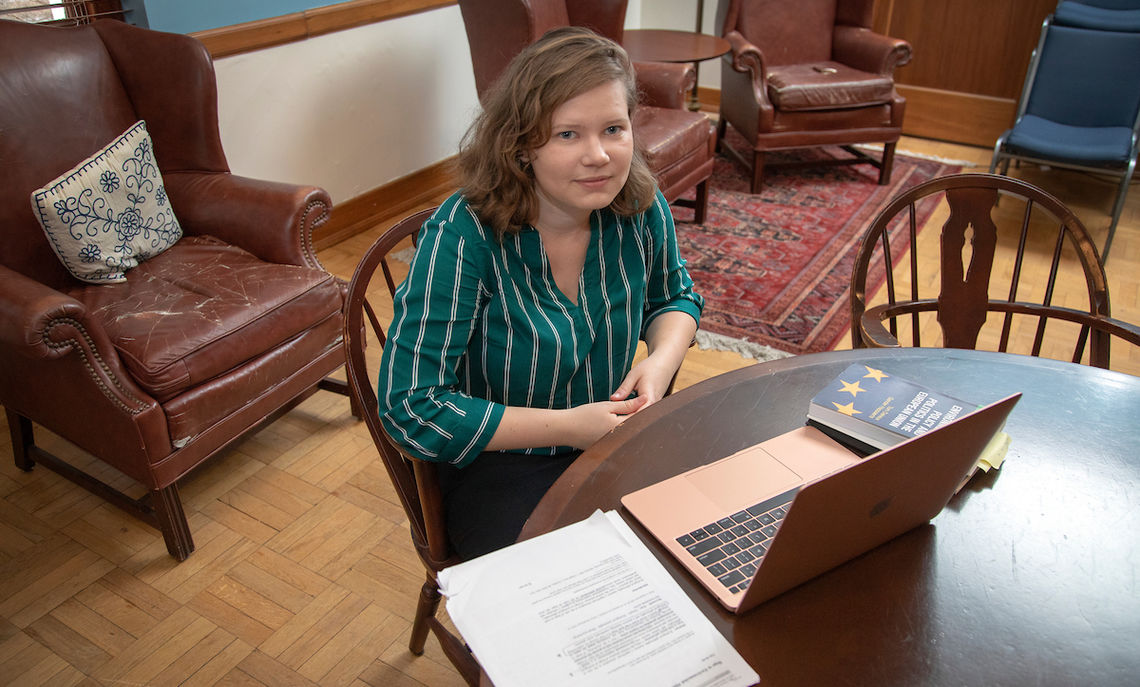F&M Stories
Student Examines German Energy Policy in German
With a desire for less reliance on coal and no more nuclear power, Germany wants to switch its energy supply by 2050 to renewables, particularly wind, solar and hydroelectricity.
Franklin & Marshall College senior Teresa Norman is researching this transition, what the Germans call "Energiewende," as an independent study that requires her to use her German-language skills as well as her analytical abilities.
"I'm a double major in German and environmental studies, and so I have an interest down the line in merging those two majors in my career field," said Norman, who wants to work in the environmental field in Germany.
The research project she will present at F&M's Research Fair this year analyzes the feasibility of the Germans' energy transition program. Assistant Professor of Environmental Studies Elizabeth De Santo guided Norman in her work, particularly on European Union policy issues.
"She's been a big help in that regard," Norman said of the professor. "She has the EU and environmental policy expertise."
"The Energiewende is a massive energy turnaround for Germany," Norman said. "I'm looking at whether the Germans will succeed and what that means in terms of environmental ambition versus pragmatism, whether it's OK to be hopeful and set goals too high or whether that will be detrimental to the project."
The Baltimore native doubts whether the Germans can meet the carbon-emission goals before the deadlines they set for themselves.
"The Germans have seen a huge success rate in their renewable energy usage, mostly solar and wind," she said. "The goal was 30 percent in wind and solar, but that's now over 30 percent, so they're seeing some success, but they're still struggling to reach their benchmarks."
Cost is a significant hurdle to achieving energy transition, Norman said. "It's a very expensive venture, for both the nation as a whole and for energy consumers."
Germany gives subsidies for solar panels, for example, but the individual home that generates enough electricity to feed the grid gets paid for that contribution, Norman said.
Norman also is analyzing the political factors for achieving success. The right-wing Alternative fur Deutschland Party, which has gained significant power in recent years, is more supportive of coal than alternative energies. The party poses a threat to Energiewende, Norman said.
In her research paper, which she presented to her language class in German and will submit to the Department of Earth and Environment in English, Norman said, "One must look at the feasibility of the plan, and whether its weaknesses—cost, public perception, and a changing political scene—will be capable of undermining it."
Related Articles
October 30, 2024
Jake Lamb ’25: F&M Transfer ‘One of the Best Decisions I’ve Ever Made’
“Becoming a Diplomat has changed me for the better,” said Jake Lamb ‘25. Learn about his experience transferring to F&M and meet other students who made the switch.
October 16, 2024
Senior Interns to Protect Farmland in Lancaster
Jessica Perfit ’25 spent her summer surrounded by Lancaster countryside. “Since I arrived in Lancaster to attend F&M, I have developed an appreciation for agriculture,” she said. The environmental studies and dance major interned with Lancaster Farmland Trust, a nonprofit focused on preserving farmland.
October 11, 2024
Professor’s Book Looks at Securing the Seas
In her recently published book about protecting the oceans through conservation, F&M's Elizabeth De Santo explores the geopolitical, environmental justice and science implications.

